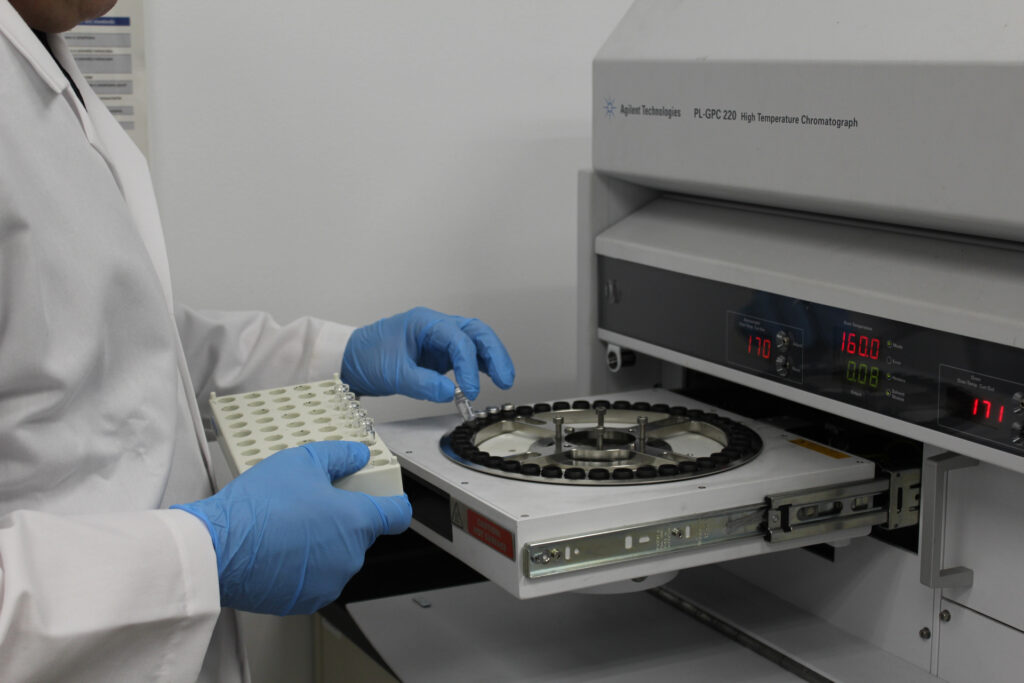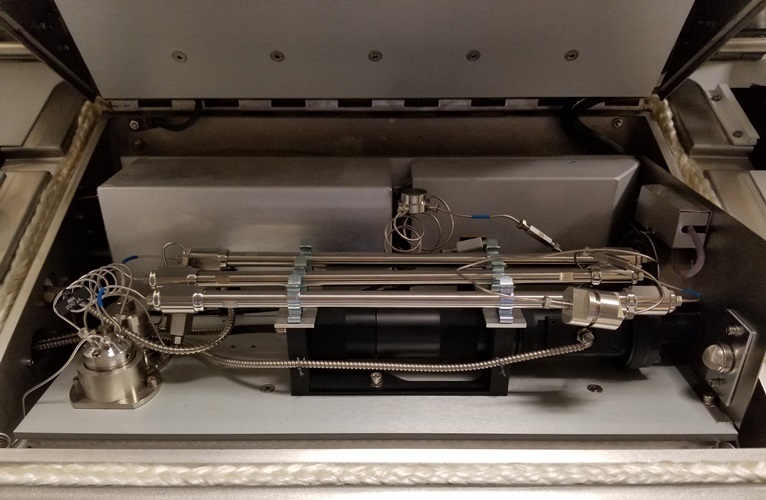GPC/SEC
Gel Permeation Chromatography (GPC), otherwise known as Size Exclusion Chromatography (SEC), is a commonly used technique for determination of molecular weight. In GPC/SEC, a dilute solution of the analyte in question is prepared using a good solvent for the analyte to ensure good dissolution and expansion of the polymer chains in solution. The solution is injected into a packed column containing a distribution of pore sizes which separate the polymer chains by size. Exiting the column, the size-separated chains are effectively ‘counted’ by a refractive index detector according to their elution time from the column.
A series of calibration standards (polymers with known molecular weight) are also run through the column, which allows correlation of the elution time to a molecular weight. This analysis allows the calculation of a molecular weight distribution, along with molecular weight moments (number-, weight-, viscosity-, z-averaged, and z+1-averaged molecular weights).
Multiple Detectors for Measurement of Branching
- Refractive Index
- Viscometry
- Multiangle Laser Light Scattering (MALLS)
In addition to the standard refractive index detector, CPG can also perform multi-angle light scattering to provide absolute molecular weight, and viscometry, to provide a universal calibration method. The coupling of refractive index, light scattering, and viscometry, termed triple detection GPC, also allows determination of degree of branching in branched polymers.
Polymers Characterized By GPC Testing
Successful GPC/SEC characterization relies on understanding the proper solvent conditions, temperature, concentration, and column setup, along with knowledgeable interpretation of the results.
CPG can perform GPC on water soluble polymers natural materials, such as hyaluronic acid, as well as organic-soluble materials, even at elevated temperatures. Some examples of polymers that CPG has tested:
Aqueous
- Polyvinyl alcohol
- Polyethylene oxide
- Hyaluronic acid
- Dextran
- Polysaccharides
Organic (Room Temperature)
- Polystyrene
- Polymethyl methacrylate
- Polyurethanes
- Silicones
- Pebax
- Polyvinyl chloride
- Polycaprolactone
- Polybutadiene
Organic (Elevated Temperature)
- Polyethylene
- Polypropylene
- Ethylene vinyl acetate
Applications of GPC/SEC Analysis
GPC/SEC is run to help determine physical property differences between samples, such as tensile strength or wear behavior, as well as processing differences, as melt viscosity of polymers can scale with molecular weight raised to the factor of 3 or more. GPC is particularly useful in assessing degradation behavior in materials, as well as lot-to-lot variation in raw resin.
Relevant standards
ASTM D6474 Standard Test Method for Determining Molecular Weight Distribution and Molecular Weight Averages of Polyolefins by High Temperature Gel Permeation Chromatography
ASTM D5296 Standard Test Method for Molecular Weight Averages and Molecular Weight Distribution of Polystyrene by High Performance Size-Exclusion Chromatography
ISO 13885-1 Binders for Paints and Varnishes — Gel Permeation Chromatography (GPC) — Part 1: Tetrahydrofuran (THF) as Eluent
GPC Contract Testing
Why use Cambridge Polymer Group as your contract GPC testing lab?
- Fast response times
- We ask methodical questions at project outset to ensure we’re using appropriate sample preparation and testing conditions to answer your questions.
- We make sure you understand both what the test will mean in the context of your problem, as well as the limitations of the technique.
- High quality data – high resolution separations, triplicate injections, exceptional precision
- Data interpretation – we provide contextual interpretation, not just numbers and graphs.
- Our expert knowledge of polymer science drives test method setup and interpretation.
- Statistical analysis and group comparison in the context of your project
- Competitive pricing and TAT
- ISO 17025 accreditation
Contact us for your free GPC quote.


